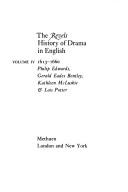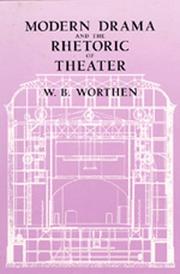| Listing 1 - 2 of 2 |
Sort by
|


ISBN: 041613050X 9780416130508 Year: 1981 Publisher: London : Methuen,
Abstract | Keywords | Export | Availability | Bookmark
 Loading...
Loading...Choose an application
- Reference Manager
- EndNote
- RefWorks (Direct export to RefWorks)
820-2 --- Engelse literatuur: toneel; drama --- English drama --- Theater --- Drama in English --- England --- History and criticism. --- History. --- to ca 1975 --- Theatre --- history --- to ca 1975. --- history. --- 820-2 Engelse literatuur: toneel; drama --- History --- To ca 1975. --- American drama --- History and criticism --- English drama - History and criticism --- American drama - History and criticism --- Theater - English-speaking countries - History

ISBN: 0520074688 0585280983 9780585280981 9780520074682 9780520963047 0520963040 0685526836 9780685526835 0520286871 1336029730 Year: 1992 Publisher: Berkeley University of California Press
Abstract | Keywords | Export | Availability | Bookmark
 Loading...
Loading...Choose an application
- Reference Manager
- EndNote
- RefWorks (Direct export to RefWorks)
In Modern Drama and the Rhetoric of Theater, W.B. Worthen examines how the dynamic interplay between dramatic text and stage production shapes the audience's experience in the modern theater. Dividing the "rhetoric" of theatrical performance into three modes--realistic, poetic, and political--Worthen traces the course of British and American drama from the 1880's through the 1980's, showing how textual conventions and performance practices direct the interpretive performance of the theater audience. The realistic theater translates the objectivity associated with science into a vehicle for treating social class. Worthen examines realism's onstage representation of social "others" for an invisible, privileged offstage audience; he discusses the problem drama of the turn of the century (Robins, Shaw, Galsworthy, Glaspell), the experiments of O'Neill, Rice, and the American Method, and the contemporary realism of Pinter, Shepard and Bond. Where realistic theater relies on the "natural" qualities of the stage scene, poetic theater uses the poet's word, the text, to control performance. The plays of Yeats, Auden, Eliot, and Beckett explore the kinds of authority--over actors and audiences--that poetic theater can achieve. Modern political theater, by contrast, openly places the audience at the center of its rhetorical designs, and the drama of the postwar period (Barnes, Brenton, Churchill, Fornes, Nichols, Osborne, Soyinka) is shown to develop a range of post-Brechtian practices that make the audience the subject of the play. Treating a wide variety of plays and drawing extensively on performance history, Modern Drama and the Rhetoric of Theater outlines the strategies that have produced both the modern drama onstage and the modern audience in the theater.
English literature --- American literature --- Drama --- anno 1900-1999 --- American drama --- English drama --- Theater --- Théâtre américain --- Théâtre anglais --- Théâtre --- History and criticism --- Production and direction --- History --- Histoire et critique --- Production et mise en scène --- Histoire --- History and criticism. --- 820-2 "19" --- -English drama --- -Theater --- -Dramatics --- Histrionics --- Professional theater --- Stage --- Theatre --- Performing arts --- Acting --- Actors --- Engelse literatuur: toneel; drama--20e eeuw. Periode 1900-1999 --- -History --- -Engelse literatuur: toneel; drama--20e eeuw. Periode 1900-1999 --- 820-2 "19" Engelse literatuur: toneel; drama--20e eeuw. Periode 1900-1999 --- -English literature --- -American drama --- Théâtre américain --- Théâtre anglais --- Théâtre --- Production et mise en scène --- Dramatics --- Theater - English-speaking countries - History - 20th century.
| Listing 1 - 2 of 2 |
Sort by
|

 Search
Search Feedback
Feedback About UniCat
About UniCat  Help
Help News
News